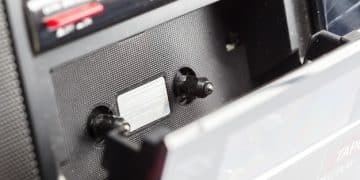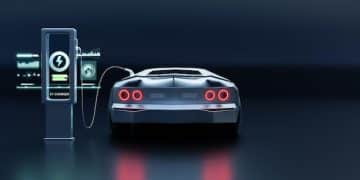Fast Charge Future: US Research on 5-Minute Battery Tech
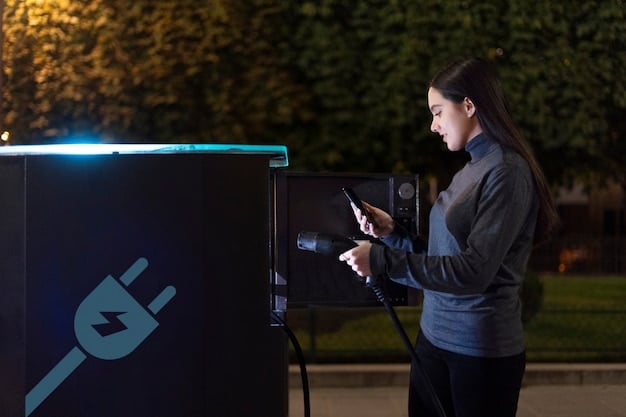
US research unveils a groundbreaking battery technology promising full charges in just 5 minutes, potentially revolutionizing electric vehicles and consumer electronics by significantly reducing charging times and enhancing energy efficiency.
The world of energy storage is on the cusp of a revolution, with US Research Unveiling New Battery Technology: Charging in 5 Minutes Possible? Imagine powering up your electric vehicle or smartphone in the time it takes to brew a cup of coffee.
The Quest for Faster Charging Batteries
For years, scientists and engineers have been relentlessly pursuing the holy grail of battery technology: faster charging times. The limitations of current battery technology often hinder the widespread adoption of electric vehicles and create inconveniences for users of portable electronic devices. The ability to rapidly replenish energy storage devices would not only enhance user experience but also pave the way for new applications and industries.
The Challenges of Current Battery Technology
Traditional lithium-ion batteries, while ubiquitous and reliable, face several challenges when it comes to charging speed. One of the primary bottlenecks is the rate at which lithium ions can move from the cathode to the anode during charging. This process is often limited by the internal resistance of the battery and the diffusion rate of the ions. Furthermore, rapid charging can lead to heat generation, which can degrade the battery’s performance and lifespan.
The Environmental Impact of Battery Technology
Beyond performance considerations, the environmental impact of battery technology is a growing concern. The mining and processing of raw materials, such as lithium and cobalt, can have significant ecological consequences. Moreover, the disposal of spent batteries poses a challenge due to the presence of hazardous materials. Therefore, the development of more sustainable and environmentally friendly battery technologies is crucial for a greener future.
- Reducing charging times enhances the usability of electric vehicles.
- Developing sustainable battery materials minimizes environmental impact.
- Improving battery lifespan reduces waste and resource consumption.
The development of faster charging batteries is not merely a technological pursuit; it is a critical step towards a more sustainable and efficient energy future. By overcoming the limitations of current battery technology, researchers are paving the way for a new era of energy storage.
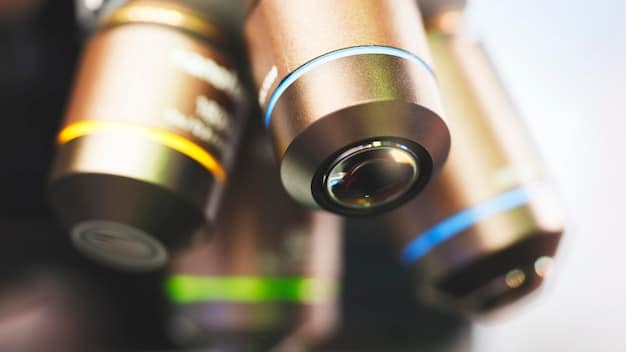
Understanding the New Breakthrough
Recent breakthroughs in battery technology have brought the dream of 5-minute charging closer to reality. Researchers in the US have developed a novel battery design that significantly reduces charging times while maintaining or even improving energy density and lifespan. This innovative approach addresses the key limitations of traditional lithium-ion batteries and offers a promising pathway towards widespread adoption of ultra-fast charging.
Novel Materials and Architectures
The new battery technology leverages advanced materials and innovative architectures to overcome the limitations of conventional designs. Nanomaterials, such as carbon nanotubes and graphene, are used to enhance electron and ion transport within the battery. These materials provide a higher surface area and improved conductivity, enabling faster charging and discharging rates. Additionally, novel electrode architectures, such as three-dimensional structures, are employed to maximize energy density and minimize internal resistance.
Overcoming Overheating Challenges
One of the major challenges of rapid charging is the generation of heat, which can degrade battery performance and lifespan. To address this issue, the new battery technology incorporates advanced thermal management strategies. These strategies include the use of thermally conductive materials and optimized cooling systems to dissipate heat more efficiently. By minimizing temperature rise during rapid charging, the battery can maintain its performance and lifespan.
- Nanomaterials enhance electron and ion transport for faster charging.
- Innovative architectures maximize energy density and minimize resistance.
- Advanced thermal management strategies prevent overheating during rapid charging.
The combination of novel materials, innovative architectures, and advanced thermal management strategies has enabled researchers to achieve a significant breakthrough in battery technology, paving the way for 5-minute charging capabilities.
The Science Behind Ultra-Fast Charging
The ability to charge a battery in just 5 minutes is not merely a matter of increasing the voltage or current. It requires a deep understanding of the underlying electrochemical processes and careful engineering of the battery’s components. The science behind ultra-fast charging involves optimizing the transport of lithium ions, minimizing internal resistance, and managing heat generation.
Enhancing Ion Transport
The rate at which lithium ions can move from the cathode to the anode during charging is a critical factor limiting charging speed. To enhance ion transport, researchers have employed various strategies, such as using electrolytes with higher ionic conductivity, modifying the electrode materials to improve ion diffusion, and creating pathways for ions to move more freely within the battery. These efforts have resulted in a significant increase in the speed at which lithium ions can travel through the battery.
Minimizing Internal Resistance
Internal resistance is another major factor limiting charging speed. The higher the internal resistance, the more energy is lost as heat during charging. To minimize internal resistance, researchers have focused on optimizing the battery’s architecture and materials. This includes using highly conductive materials for the electrodes and current collectors, reducing the distance that ions and electrons have to travel, and improving the contact between the different components of the battery.
- Optimizing the electrolyte composition to facilitate faster ion movement.
- Reducing the size of electrode particles to enhance ion diffusion rates.
- Using conductive additives to improve electron transport within the electrodes.
By addressing these challenges and leveraging the latest scientific advancements, researchers have made significant strides in the development of ultra-fast charging battery technology.
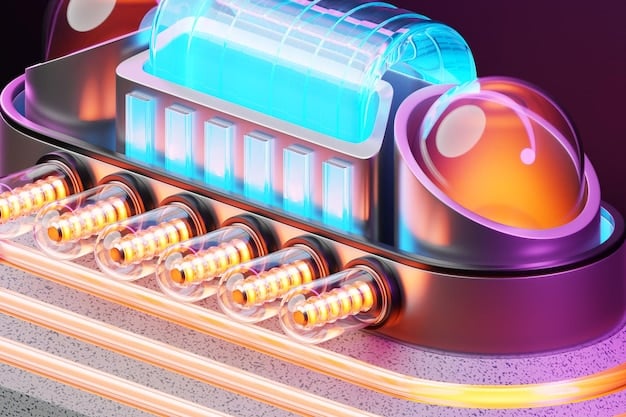
Potential Applications and Impact
The advent of 5-minute charging battery technology has the potential to revolutionize various industries and transform the way we use energy. From electric vehicles to consumer electronics, the ability to rapidly replenish energy storage devices would unlock new possibilities and enhance existing applications.
Electric Vehicles
One of the most significant impacts of 5-minute charging battery technology would be on the electric vehicle industry. Currently, the long charging times of electric vehicles are a major barrier to their widespread adoption. With the ability to fully charge an electric vehicle in just 5 minutes, drivers would no longer have to worry about long waits at charging stations. This would make electric vehicles more convenient and appealing to a wider range of consumers, accelerating the transition to a cleaner transportation system.
Consumer Electronics
The impact of 5-minute charging battery technology would also be felt in the consumer electronics industry. Imagine being able to fully charge your smartphone, laptop, or tablet in just 5 minutes. This would eliminate the frustration of waiting for devices to charge and allow users to stay connected and productive for longer periods of time. Additionally, the technology could enable new applications, such as high-performance portable gaming devices and augmented reality headsets, which require large amounts of power and fast charging capabilities.
Beyond electric vehicles and consumer electronics, 5-minute charging battery technology could also have significant implications for energy storage systems, grid stabilization, and emergency power supplies. The ability to rapidly replenish energy storage devices would make them more versatile and reliable, enabling new applications and improving existing ones.
Environmental Benefits and Sustainability
The development of faster charging batteries is not only a technological advancement but also an important step towards a more sustainable future. By enabling the widespread adoption of electric vehicles and other clean energy technologies, these batteries can help reduce carbon emissions and mitigate the impacts of climate change. Additionally, advancements in battery materials and manufacturing processes are making these batteries more environmentally friendly throughout their lifecycle.
Reducing Carbon Emissions
Electric vehicles powered by fast-charging batteries have the potential to significantly reduce carbon emissions from the transportation sector. By replacing gasoline-powered cars with electric vehicles, we can reduce our dependence on fossil fuels and lower greenhouse gas emissions. As the electricity grid becomes cleaner with the increasing use of renewable energy sources, the environmental benefits of electric vehicles will become even more pronounced.
Promoting Sustainable Materials
Researchers are also working on developing more sustainable battery materials that are less harmful to the environment. This includes exploring alternatives to lithium and cobalt, which are often mined in environmentally sensitive areas. Additionally, efforts are being made to improve battery recycling processes to recover valuable materials and reduce waste.
- Reducing reliance on fossil fuels through electric vehicle adoption.
- Decreasing greenhouse gas emissions and mitigating climate change.
- Promoting the use of sustainable and responsibly sourced battery materials.
By embracing sustainable practices throughout the battery lifecycle, we can minimize the environmental impact of energy storage and create a more sustainable future for generations to come.
Challenges and Future Directions
While the recent breakthroughs in 5-minute charging battery technology are promising, several challenges remain before these batteries can be widely deployed. These challenges include scaling up production, reducing costs, ensuring safety, and addressing concerns about battery lifespan.
Scaling Up Production
One of the major challenges is scaling up the production of these advanced batteries to meet the growing demand. This requires significant investments in manufacturing infrastructure and the development of efficient and cost-effective production processes. Additionally, it is important to ensure that the production of these batteries is environmentally sustainable and socially responsible.
Ensuring Safety and Lifespan
Safety is paramount when it comes to battery technology. Fast-charging batteries must be designed to operate safely under a wide range of conditions, including extreme temperatures and high currents. Additionally, it is important to ensure that these batteries have a long lifespan and can withstand repeated charging and discharging cycles without significant degradation. Further research and development are needed to address these challenges and ensure the safety and reliability of fast-charging batteries.
Overcoming these challenges will require collaboration between researchers, engineers, policymakers, and industry stakeholders. By working together, we can accelerate the development and deployment of fast-charging battery technology and unlock its full potential to transform the way we use energy.
| Key Point | Brief Description |
|---|---|
| ⚡ Fast Charging | New tech allows full battery charge in just 5 minutes. |
| 🚗 Electric Vehicles | Reduces charging time concerns, boosting EV adoption. |
| 🔋 Sustainable Tech | Promotes eco-friendly materials and reduced emissions. |
[Frequently Asked Questions]
US research unveils a groundbreaking battery technology capable of charging in just 5 minutes. This innovation promises to transform the world of energy storage, with potential applications ranging from electric vehicles to consumer electronics. The challenges of scaling up production, ensuring safety, and addressing concerns about battery lifespan remain, but the potential benefits of this technology are immense. By enabling faster charging times, promoting sustainable materials, and reducing carbon emissions, this research paves the way for a cleaner, more efficient, and more sustainable energy future.
